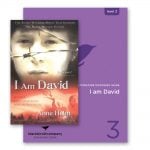Section 1: Chapters 1-2
Vocabulary
- catastrophe: an event causing great and often sudden damage or suffering; a disaster
- grating: sounding harsh and unpleasant
- irresolute: showing or feeling hesitancy, uncertainty
- lithe: thin, supple, and graceful
- mutter: to say something in a low or barely audible voice, especially in dissatisfaction or irritation
- quay: a concrete, stone or metal platform lying alongside or projecting into water for loading or unloading ships
- runnel: a narrow channel in the ground for liquid to flow through
Comprehension Questions
- The instructions that the man gives to David are to help him escape; wait for the lighted match to signal the current is cut off, take the compass by the tree and head south for Salonika. The get on a boat heading for Italy and hide. (pg. 1-3)
- David requests that the man give him a piece of soap. (pg. 3)
- Since he was little David has desired to get the better of the man and his captors. (pg. 7)
- After reaching the thicket David realizes that no-one has fired. (pg. 7)
- While riding in the back of the truck David recalls the memory of Johannes, a man to whom he could say anything, suddenly dropped to the ground and died. (pg. 19)
- While on the boat David is filled with loneliness when he realizes that Johannes is no longer with him, that he stayed in Salonika. (pg. 22)
- By the end of chapter one David realizes that upon seeing beauty for the first time he no longer wants to be caught; he no longer wants to die, that he wants to live. (pg. 29)
- As David prepares himself to interact with people he realizes that he must have a story that he would stick to when and if he were questioned. (pg. 43)
- When David assess the situation he realizes that the advantages he has are his muscles are strong, he has sharp eyes and ears, he is able to survive on very little food, knows the treachery of people, and best of all he understands many languages. His disadvantages are that he knows nothing about the geography of countries and which are free; he knows nothing about wild foods, and worst of all the people. (pg. 39-41)
- With the passing of time David’s belief that he will escape capture grows. (pg. 49)
Section 2: Chapters 3-4
Vocabulary
- brevity: concise and exact use of words in writing or speech
- disconcert: disturb the composure of; unsettle
- ignorant: lacking awareness of knowledge in general; uneducated or unsophisticated
- inundate: to overwhelm with things or people to deal with
- muster: assemble, especially for inspection or preparation for battle
- sinister: giving the impression that something harmful or evil is happening or will happen
- undulate: move with a smooth wavelike motion
Comprehension Questions
- David stumbles over a rock and drops his most precious possession, the compass into the sea. (pg. 66/67)
- The god that David chooses is the god of David, theGod of the green pastures and still waters because Johannes had talked about David and his God seemed stronger then men. (pg. 68/69)
- When David meets the man and woman on the road he asks if England has a king because he knows that if a country has a king of queen then it is a free country. (pg. 73/74)
- On watching David the woman notices his eyes and manner and recognizes that he is no ordinary little boy. (pg. 74)
- David has two reasons for finding a mirror, first he would be able to see what was wrong with his eyes and secondly he could work on changing his eyes. (pg. 76)
- At first David’s freedom had not mattered much to him because he expected to be caught at any moment, but now that he has been free for so long he couldn’timagine giving it up. (pg. 83)
- The two things that David asks God for are to have his terrible fear taken for atime so that he can wave down a truck and that the man driving the truck wouldbe a good man. (pg. 91/92)
- In chapter 4 the strange new sound that David hears is music, something that had been described to him, but which he had never heard. (pg. 98)
- When attacked by Carlo, David doesn’t defend himself because if he hits back he is just as worthless and unworthy of freedom as the boy is. (pg. 100)
- After rescuing Maria, David realizes that he has smiled for the first time and that is comes as a response to happiness. (pg. 112/113)
Section 3: Chapters 5-6
Vocabulary
- deception: an act or statement that is made to deliberately mislead
- emaciated: abnormally thin or weak, especially because of illness or lack of food
- foreboding: fearful apprehension; a feeling that something bad will happen
- fugitive: a person who has escaped from a place or is in hiding
- indebted: owing money
- ingratiate: bring oneself into favor with someone through flattery or trying to please them
- obstinate: stubbornly refusing to change one’s opinion or chosen course of action
Comprehension Questions
- What David is learning about language and the use of words is that there are many words that mean the same thing but convey a degree of how good or beautiful something is. The more words known the better a person could communicate. (pg. 131/132)
- David asks for a book that was published before 1917 because then he would know that what was written was true and not written by “them.” (pg. 133)
- David decides that Carlo is a bad person because he is so good at hiding his intentions. (pg. 139)
- David feels more comfortable with Maria because she recognizes when he is uncomfortable, never makes him feel ignorant and wants to know what he thinks about. (pg. 140)
- The only thing that sounds more wonderful to David than sunshine and beauty is the thought of attending school. (pg. 141)
- When David sees the milk he remembers that the man in the camp had given him milk and vitamins, and he now knew this was good for him, but he doesn’t understand why the man did this. (pg. 147)
- The priest reveals to David that his God is the same God that the priest believes in, the same God of the church he was in. (pg. 173)
- The priest offers to take him home and give him a meal, but David asks if he has a map that shows Italy and where Switzerland begins. (pg. 175)
- David realizes that since living in the house with a family he has changed and he is no longer completely content, that living a life outdoors has lost some of its value. (pg. 179)
- In a concentration camp it was essential for David to not grow fond of anyone, but after meeting Maria and her family he finds that he can no longer be that detached. (pg. 180)
Section 4: Chapters 7-8
Vocabulary
- apathy: lack of interest, enthusiasm or concern
- apprehensive: anxious or fearful that something bad or unpleasant will happen
- gale: a very strong wind
- precipice: a very steep rock face or cliff
- shirk: to avoid or neglect, often a duty or responsibility
- vagabond: a person who wanders place to place without a home or job
- dejected: sad and depressed
Comprehension Questions
- The man had helped David in the camp by giving him milk and vitamins, and he now realized the man had seen to it that Johannes took care of him in the camp. (pg. 197)
- David and King become met in the shed, King the dog approached David, sniffed him and then lay next to him. They soon became friends. (pg. 204/206)
- The farmer tries to hide the fact that spring is coming because he doesn’t want to lose David a laborer on the farm as he had said when spring came he would call the police. (pg. 209)
- David becomes angry at God when the farmer bars the shed each night, but then he realizes that maybe God is trying to teach him a lesson. That David had not been willing to forgive Carlo, even though he had apologized many times and had tried to be his friend. (pg. 211)
- King tries to protect David when the farmer tries to hit him, and the protectiveness of the dog causes David to cry. (pg. 214)
- David has to frequently lie when he talks to people and this makes him very uncomfortable as he wants to be honest. (pg. 224)
- When David realizes that he is back with “them” and that he should have noticed that the three people he met on the road had the dejected, sorrowful, dull-eyed look of those in the concentration camps. (pg. 228/229)
- When David prays to God at first he asks that soldiers aim straight so when he dies it won’t hurt so much, but then he remembers how King protected him and asks God to take care of him and new good owners would be found for him. (pg. 231)
- After blaming himself for King’s fate David realizes that King had freely chosen to follow him and that he had acted according his will and nature and chose to protect David. (pg. 233)
- As soon as the door of the woman’s house is opened David realizes that she is the woman from the photograph, she is his mother. (pg. 239)

